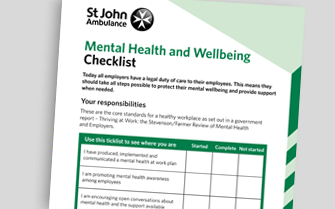After a long 18 months, employees are slowly returning to the workplace as COVID-19 restrictions continue to ease and here at St John Ambulance, we believe that mental health is more important than ever. Now is the time to put the spotlight back onto mental health to ensure your employees feel mentally and emotionally supported on their return to the workplace.
In the UK, depression, stress, and anxiety are the largest cause of sickness absence. Every year, mental illness costs UK businesses around £35 billion, £10.6 billion of which is lost to sickness absence, £21.2 billion in reduced productivity, and £3.1 billion in substituting staff members who vacate their roles due to mental illness.
Approximately 1 in 4 people in the UK will experience a mental illness each year
Take our mental health quiz to test your knowledge on mental health terms and key statistics.







